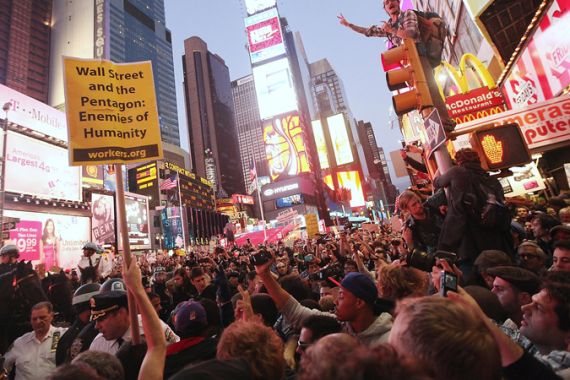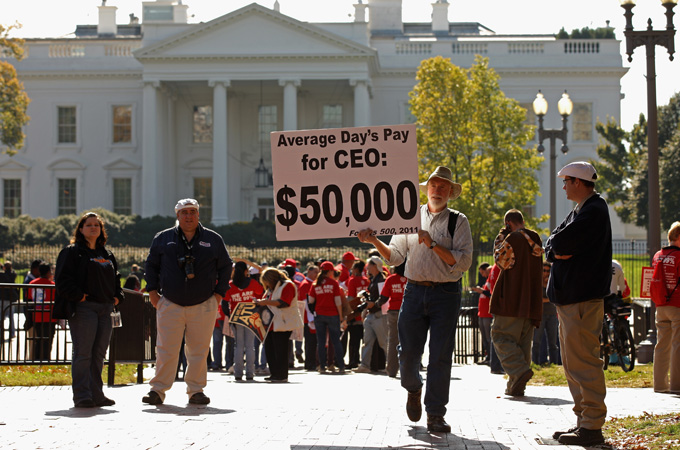‘Occupy Wall Street’ and Obama
If ‘Occupy’ keeps up the pressure, Obama could be compelled to adopt more progressive policies.

 |
| Opinion polls show many Americans think that the economic system is rigged in favour of the richest [GALLO/GETTY] |
SAN FRANCISCO, CALIFORNIA – The bursting to life of the Occupy Wall Street movement is the most hopeful development in American politics since Barack Obama was elected president three years ago this month. Obama’s election has turned out to be largely a false hope. But that false hope might still be redeemed – and the president motivated to become the reformer he once pledged to be – if the Occupy movement grows into the kind of massive, broad-based, relentless movement no president can afford to ignore.
Already, the Occupy Wall Street website claims that the movement has spread to 100 cities in the United States and inspired sympathy actions in 1,500 cities around the world. Momentum appears to be building in other ways as well. Activists in other progressive movements – environment, labour, anti-poverty and housing – are beginning to collaborate with Occupy. TV commercials are airing on mainstream media outlets, even Fox News, spreading Occupy’s message that the US political and economic system is rigged in favour of the top one per cent. And opinion polls are indicating that a sizeable majority of Americans agree with this analysis, though there seems to be less support for the Occupy activists themselves.
The latest big protest targeted the White House itself, when an estimated 12,000 people physically surrounded the home of the US president last Sunday to urge rejection of a proposed climate-killing oil pipeline. Stretching 1,700 miles from Canada to the Gulf of Mexico, the Keystone XL Pipeline would transport tar sands, an extremely dirty and carbon intensive form of oil, to refineries in Texas. Environmentalists have portrayed it as a make-or-break moment for President Obama to live up to his promise as a candidate in 2008 to fight climate change and kick the US addiction to oil. The crowd surrounding the White House on Sunday turned candidate Obama’s famous campaign slogan back on the president, chanting, “Stop the Pipeline, Yes We Can”. There were also expressions of solidarity with the Occupy movement, including a massive sign reading “OCCUPY EARTH”, and shouts of, “We are the 99 per cent”.
And now it’s official. Hours after this commentary was first posted, the State Department announced that it would delay making a decision on the tar sands pipeline until after it had undergone extensive further review, including a search for an alternate routing. In effect, this puts off any decision until 2013 at the earliest and probably dooms the project, if Obama is re-elected. Score another victory, and against very long odds, for street protests.
These activists have made the pipeline a defining issue for Obama’s presidency. They have also made it very difficult, though hardly impossible, for the president to approve it. In response to the mounting pressure, Obama publicly took ownership of the issue last week, telling a local TV interviewer that he himself would make the final decision (rather than passing the buck to the State Department) and adding that creating a few thousand jobs in the short-term might not be worth polluting the air, earth and water our kids need to grow up healthy. And the day after the White House protest came the news that the Inspector General (aka, the internal cop) of the State Department is going to investigate State’s ethically-challenged review of the pipeline application. This, my friends, is the sound of an administration backtracking. Mass protests can make that sort of thing happen.
Media coverage
The White House protest generated lots of media coverage, including in mainstream outlets. Surprising? Not really. Twelve thousand people is a lot of people, and physically surrounding the White House is a neat trick; no protest in recent memory has done that. What’s more, this protest came after weeks of media coverage of Occupy actions across the nation, so the media was primed. The media loves trends, and street protests against inequality, corporate skullduggery and its political enablers is beginning to be a trend in the US.
Other sparks of resistance: A consumer uprising organised through social media has led Bank of America to drop plans to charge customers a $5 monthly fee for using their debit cards. In addition, an estimated one million Americans have withdrawn their money from big banks and moved it to community banks or credit unions. And there is even talk of a “debtors’ strike”, in which homeowners and college graduates with onerous mortgage and student loan payments will collectively refuse to pay until big banks adjust the terms to affordable levels.
It’s entirely possible these actions are only the beginning, for opinion polls indicate that most Americans agree with the core message of Occupy. By a three-to-one margin, Americans tell pollsters they agree that, “Our economy works for Wall Street CEOs but not for the middle class”. They believe that the richest one per cent should be taxed more to pay for education, job creation and environmental protection. They reject official Washington’s obsession with deficit reduction and spending cuts, affirming that the government’s chief priority should be creating jobs. Americans are less enthusiastic about the Occupy protesters themselves, however. Only 30 per cent of the public say they have a “favourable” view of the Occupy movement, while 39 per cent are unfavourable and another 30 per cent say they don’t know enough about the movement to have an opinion.
Ripe conditions
In sum, conditions are ripe for the Occupy movement to grow and deepen into the kind of large, determined popular movement that strikes fear in the hearts of economic and political elites. If Occupy plays its cards right, it could bring about a profound, much-needed change in American society. And although Obama and his advisers might not realise it, the emergence of such a movement could also be the best thing that has happened to him as president.
Days after Obama was elected in November 2008, The Nation, the leading left-of-centre magazine in the US, published what has proven to be the single most prescient commentary about his presidency. Written by Frances Fox Piven, a professor at the City University of New York who has spent her career analysing social movements, the article explained “Why Obama Needs A Protest Movement”.
At a moment when many on the Left were rejoicing, Piven warned they were headed for “a terrible let-down” if they viewed Obama as “a visionary or a movement leader”. Rather, she argued, Obama had won because “he is a skillful politician. That means he will calculate whom he has to conciliate and whom he can ignore in realms dominated by big-money contributors…”
Instead of counting on Obama to implement their favourite policy proposals, Piven suggested, progressives should stay mobilised and seek to create the political conditions that would compel Obama to honour his promises. That, after all, was the secret behind the greatest wave of progressive reform in modern American history: the establishment of the New Deal by Franklin Delano Roosevelt in the 1930s. “FDR became a great president because the mass protests among the unemployed, the aged, farmers and workers forced him to make choices he would otherwise have avoided,” wrote Piven.
But Piven’s advice went unheeded, and absent grassroots pressure Obama has chosen these past three years to conciliate rather than confront the status quo. The result? A lacklustre record of domestic achievements, unemployment over nine per cent and poll numbers that call into question his re-election, despite a remarkably weak cast of Republican opponents. No US president in modern history has won re-election when the unemployment rate was over 7.5 per cent.
A long-lost voice
The Occupy movement, however, could transform this landscape by showing Obama and other elected officials that there is a political cost to favouring corporations and the super-rich over everyone else. With its brilliant slogan, “We are the 99 per cent”, the movement has at last given voice to the vast majority of citizens who have lost income, jobs, homes or pensions while the top one per cent have gotten even richer.
Already, the political conversation has changed in the US. Although much of the media coverage of the Occupy movement has been simple-minded or even hostile, there has been a great deal of it, and the effect has been to amplify the movement’s message and gain it followers. Now, budget cuts for workers and pensioners are no longer the sole focus of political debate; requiring corporations and the rich to pay their fair share of taxes is also on the agenda.
It’s too soon to say whether the Occupy movement will have staying power, much less play a role in the 2012 election. But clearly a decisive factor will be how the movement relates to Obama, and vice versa.
The Occupiers are adamant they will not be co-opted, by the president or anyone else. That is the right instinct. If this movement can remain an independent force, continue growing in numbers and diversity and keep the pressure on, it could cause both Republican and Democratic politicians to think twice about favouring the one per cent over the 99 per cent. And that could create the political space for Obama, like FDR before him, to champion policies that benefit the many over the few – which in turn might help save him from defeat in 2012.
Mark Hertsgaard (www.markhertsgaard.com) is a Fellow of the New America Foundation in Washington, DC, and the environment correspondent for The Nation. He is the author of six books that have been translated into sixteen languages, including, most recently, HOT: Living Through the Next Fifty Years on Earth.
The views expressed in this article are the author’s own and do not necessarily reflect Al Jazeera’s editorial policy.
